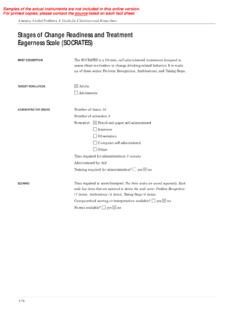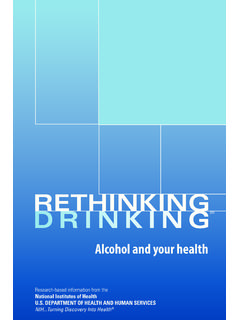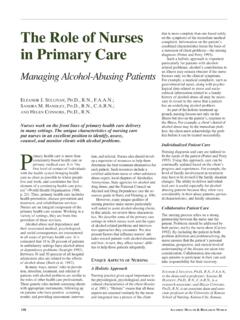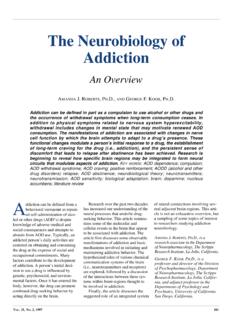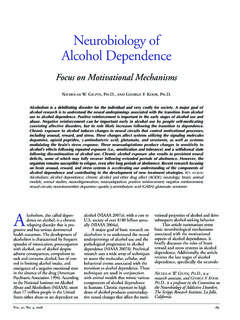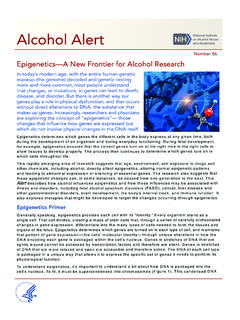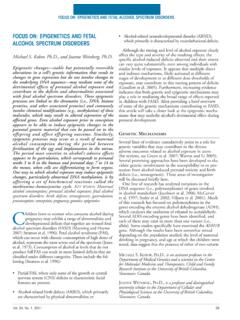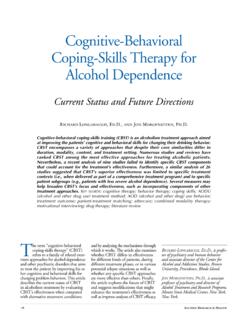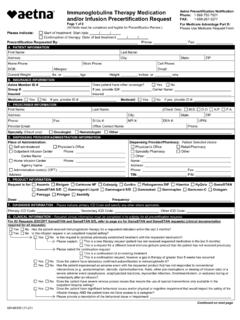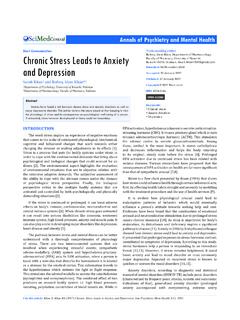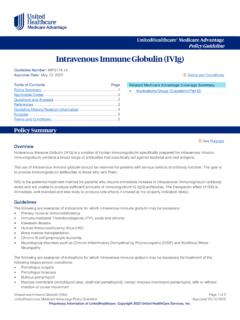Transcription of Alcohol’s Effects on the Immune System
1 Alcohol Alert Number 89 Alcohol s Effects on Immunity Increasing the Risks for Infection and InjuryMany people are aware that excessive drinkinga can be harmful to the liver and other vital organs; however, there is another, less obvious, body System that is vulnerable to the negative Effects of alcohol: the Immune System . Because of alcohol s Effects on the Immune System , peo-ple who drink to excess are at increased risk of contracting infectious diseases, may have more complications after surgery, and often take longer to recover from illness, compared with those who drink at lower levels. Disruptions in Immune System function also contribute to organ dam-age associated with alcohol consumption. This Alcohol Alert reviews the normal workings of the Immune System and explores how alcohol interferes with these Is the Immune System ?
2 Our bodies are constantly exposed to a barrage of microbes, including viruses, bacteria, and fungi. Some of these are necessary for our well-being, such as the bacteria that live in the intestine and help with digestion; others can cause illness or have other toxic Effects . The Immune System is the body s defense against infec-tious disease, helping to distinguish, for example, between good and bad bacteria and eliminating harmful organisms (so-called pathogens) from the body. Equally important, however, is the Immune System s ability to detect tissue damage and orchestrate the body s response, including removing damaged tissue and assist-ing in subsequent tissue repair and regeneration. To perform all of these functions, the Immune System relies on an elaborate network of highly specialized cells that interact in a tightly orchestrated way.
3 Some of these defense and damage-response networks are in place at birth; this is called our innate immunity. Other parts of the Immune System develop throughout life, allowing the body to learn and adapt whenever it encounters a new pathogen; this is called our adaptive immunity. The innate Immune System includes physical barriers, such as the skin, that prevent organisms from entering the body directly; physio-logical barriers, such as enzymes in the stomach and intestines, that destroy many pathogens and toxins that enter the body with food; and specialized Immune cells that work throughout the body to combat infec-tion and disease. The innate Immune System mounts the first swift response to pathogens or tissue dam-age, seeking to attack and destroy invaders or eliminate damaged cells.
4 An example of innate Immune System activation is the initial inflammation, often characterized by redness and pain, that occurs in response to an infection or infection-free tissue injury. The adaptive Immune System , on the other hand, mounts a longer-lasting response, involving numerous types of Immune cells and molecules. It not only pro-tects the body from pathogens that bypass the defenses of the innate Immune System , but it remembers each particular pathogen it encounters. Therefore, if the pathogen should invade a second time, the body can launch an even speedier and more targeted Definitions of excessive, heavy, and binge drinking may vary among the original research articles cited in this Alert. Please refer to original source for details.
5 The National Institute on Alcohol Abuse and Alcoholism (NIAAA) defines low-risk drinking as no more than 3 drinks on any single day and no more than 7 drinks per week for women, and no more than 4 drinks on any single day and no more than 14 drinks per week for men. Drinking above this level increases the risk for alcohol use disorder. NIAAA defines binge drinking as a pattern of drinking that brings blood alcohol concentration levels to g/dL. This typically occurs after 4 drinks for women and 5 drinks for men in about 2 hours. The Substance Abuse and Mental Health Services Administration defines heavy drinking as drinking 5 or more drinks on the same occasion on each of 5 or more days in the past 30 specialized Immune cells, including white blood cells, are key players in innate and adaptive immunity, particularly cells called monocytes and macrophages, neu-trophils, natural killer (NK) cells, dendritic cells, T cells, and B cells.
6 These cells circu-late in the bloodstream and also reside in primary and secondary lymphoid organs, including the thymus, bone marrow, and lymph nodes and spleen, as well as in organs like the liver and brain (see figure). This widespread distribution allows the body to respond to not only general infections but also localized infections and tissue injury. To optimally exert their Effects , the Immune cells communicate with each other and with various other cells in the body through signaling molecules called cytokines, which trigger specific Immune responses. In addi-tion, B cells produce proteins called antibodies or immunoglobulins, which rec-ognize foreign molecules and bind to them, thus marking them for the important roles of the Immune System , and the many players and interactions that contribute to its proper functioning, it is not surprising that disrup-tions to the System for example, those related to alcohol consumption can adversely affect s Effects on the Immune SystemAlcohol consumption can alter the number, survival, and function of most Immune cells.
7 Although these alter-ations alone may not be sufficient to adversely affect one s health, if a person is exposed to a second hit, such as a virus, his or her Immune System may be unable to respond properly, increasing the risk of infec-tion. The specific Effects of alcohol on the Immune System depend largely on how often and how much a person drinks. Even a single episode of binge drinking can have measurable Effects on the Immune System , from within the first 20 minutes to several hours after alcohol Over the long term, alcohol misuse weakens the Immune System and increases the risk and severity of viral and bacterial infections, including human immunodeficiency virus (HIV), hepatitis B and C, and lung It can reduce the effectiveness of vaccines and contribute to a host of diseases, including alcoholic liver disease, alcoholic pancreatitis, inflammation in the gastrointestinal tract and brain, and ,2 Alcohol also adversely affects the Immune System through its effect on the liver.
8 An important component of the innate Immune System , the liver produces a wide variety of antibacterial If the liver is severely damaged by alcohol, it is less capable of producing these proteins, thereby increasing our susceptibility to bacterial infection. Indeed, bacterial infection is one of the most common complications of severe alcoholic hepatitis and alcoholic cirrhosis. Consuming alcohol during pregnancy can disrupt development of the fetal Immune System . It can increase risk of infection and disease in infants after birth and possibly throughout their lives. One study found that the effect of prenatal alcohol exposure on neonatal infection is most significant if alcohol exposure occurred in the 2 Figure Distribution of Immune cells in the body.
9 Immune cells circulate in the bloodstream, reside in the tissues depicted here which have a dedicated role in Immune func-tion and also reside in organs such as the brain, liver, lungs, and trimester of pregnancy, a time when the Immune System is developing. The risk is even more signifi-cant for babies who are born prematurely. Additional research is needed to determine how maternal drinking affects the fetal Immune System and whether these Effects can be reversed or s Effects on the Gastrointestinal (GI) Tract In addition to its direct Effects on the Immune System , alcohol can have an indirect impact on immunity through its actions in the stomach and intestines (GI tract). The GI tract is one of the first parts of the body to come into contact with alcohol and, as a result, bears the brunt of alcohol s harmful Effects .
10 The intestine is home to a wide variety of bacteria necessary for proper digestion; however, these bacteria can become problematic if they are not well-controlled and held in careful balance with each other. Chronic alcohol consumption alters the composition of bacteria in our GI tract, collectively known as microbiota. It reduces the numbers of beneficial bacteria and allows an increase in unhealthy bacteria. This imbalance lim-its the ability of Immune cells in the GI tract to distinguish between normal and disease-causing organisms,5 and it is associated with diseases such as irritable bowel syndrome, food allergies, diabetes, cancer, obesity, and cardiovascular alcohol exposure, and indeed even a single episode of binge drinking, can also damage the wall of the intestine, allowing bacterial toxins and other harmful byproducts to leak from the intestine into the blood-stream.
